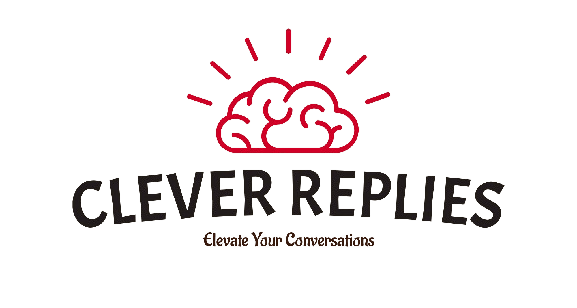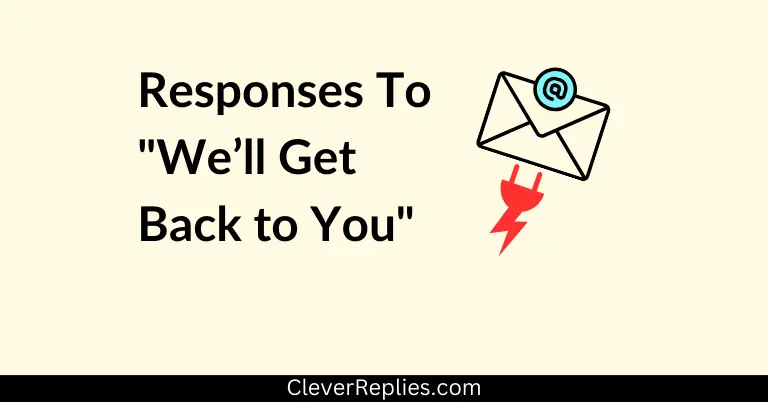21+ Formal Responses to ‘We’ll Get Back to You’ (+ Alternatives)
“We’ll get back to you.” It’s a phrase that’s polite yet undeniably vague, often leaving you wondering, “Will they?” or “Won’t they?”
If you’re uncertain about how to respond, you’re not alone!
This article is packed with actionable insights to help you transform this ambiguous statement into an opportunity for clearer communication.
We’ll explore practical ways to respond, as well as alternative phrases you can use if you’re the one delivering the message.
What Does ‘We’ll Get Back to You’ Mean?
The phrase “We’ll get back to you” can carry different meanings based on the situation, tone, and context in which it is used. While it sounds polite and professional, the real intent behind it isn’t always straightforward.
Below are some common interpretations:
1. Genuine Follow-Up
In its most sincere form, this phrase indicates that the person or team truly intends to revisit the matter after taking some time to evaluate, discuss, or decide.
This could happen in situations like:
- A hiring manager needing more time to review candidates.
- A team member consulting others before finalizing a decision.
In such cases, patience and a polite follow-up can often yield positive results.
2. Polite Dismissal
Sometimes, “We’ll get back to you” is a subtle way of avoiding a direct “no.” This might be used to end a conversation or postpone further discussion when the other party isn’t interested but wants to remain courteous.
For example:
- A client who doesn’t plan to proceed with your proposal.
- A recruiter who has already decided on another candidate but doesn’t want to share the rejection immediately.
Recognizing this context is essential to avoid unnecessary waiting or false hope.
3. Need for More Time
Sometimes, it’s as simple as needing extra time. This could be due to other pressing matters or because the decision-making process isn’t complete yet.
For example:
- The person or team is caught up with other tasks.
- They’re in the middle of their decision-making process.
Things to Avoid When Responding
In order to reduce the risks of bad outcomes, here are some important red flags you should be avoiding:
- Being pushy: Avoid saying things like, “I need an answer now” or “When can I expect a response?”
- Appearing desperate: Don’t use language that suggests you are overly eager or desperate, such as “Please don’t forget about me!”
- Overloading with information: Don’t overwhelm the recipient with unnecessary details or requests. Keep it brief and to the point.
- Ignoring the implied waiting period: It’s important to respect the timeframe given and not demand an immediate response if they haven’t provided one.
21+ Formal Replies to “We Will Get Back to You”
Here are 21 of the best replies to ‘We’ll get back to you.’ Feel free to adjust them based on the context and your relationship with the other person.
ALSO READ: How To Respond to A Declined Invitation? 55 Best Replies to Use
Context-Specific Replies to ‘We’ll Get Back to You’
1. For Job Applications and Interviews
- “I appreciate your time today. I look forward to your decision and any next steps.”
- “Thank you for the opportunity to interview. I look forward to hearing about the next steps.”
- “Thanks for keeping me in the loop. I look forward to your feedback after considering my application.”
- “I’m happy to wait for your decision and remain available to provide any additional information.”
- “I’m confident that you’ll make the best decision. I look forward to hearing back from you soon.”
2. For Business Proposals
- “Thank you for considering my proposal. Please let me know if you need further clarification.”
- “I appreciate your time and attention to this proposal. I’m happy to answer any questions you may have.”
- “I’m looking forward to hearing your thoughts and discussing how we can move forward together.”
- “Thank you for your consideration. I’ll await your response and am available to discuss any details further.”
- “Thanks for the opportunity to present my proposal. I hope to hear back from you soon regarding next steps.”
3. For Clients or Stakeholders
- “Thank you for your time today. I look forward to hearing your feedback at your earliest convenience.”
- “I appreciate your consideration. If you need further details, I’m happy to provide them.”
- “Thanks for the update. I’m here if you need anything else and look forward to our next steps.”
- “I trust you’re reviewing everything carefully. Let me know if there’s anything else I can assist with.”
- “Thank you for keeping me in the loop. I look forward to working together once a decision is made.”
5. For Networking and Collaboration Opportunities
- “I look forward to hearing your thoughts on potential ways we can work together.”
- “It was great connecting with you. I look forward to exploring potential opportunities together.”
- “Thanks for your time today. I’m eager to continue our conversation and explore how we can collaborate.”
- “I appreciate you reaching out. Let me know if you would like to discuss further ideas or opportunities.”
- “Thanks for the opportunity to connect. Please let me know if there’s anything further I can contribute.”
6. For Follow-Ups When They Haven’t Responded
- “I wanted to check in and see if there are any updates regarding our discussion.”
- “I appreciate your time and wanted to see if you’ve had a chance to consider my previous inquiry.”
- “I hope this message finds you well. Just following up to see if you’ve had a chance to review my previous email.”
- “I understand you’ve been busy. Just reaching out to see if there’s any further information you need from me.”
- “I’m just following up to ensure my message didn’t get lost. Please let me know if you need any more information.”
ALSO READ: 81 Simple & Sweet Farewell Cake Messages for Coworkers
Alternative Ways to Say “We Will Get Back to You”
- “We’ll be in touch soon.”
- “You’ll hear from us soon.”
- “Expect to hear from us soon.”
- “We’ll follow up with you shortly.”
- “We’ll be reaching out to you shortly.”
- “We’ll update you as soon as possible.”
- “We’ll keep you posted on our progress.”
- “You can expect an update from us soon.”
- “We’ll be back in touch with more details.”
- “We’ll let you know our decision in due time.”
- “We will notify you once we’ve made a decision.”
- “We’ll contact you once the next steps are clear.”
- “Once we’ve made a decision, we’ll let you know.”
- “We’ll contact you once we have more information.”
- “We’ll inform you of our decision in the near future.”
- “We’re working on it and will get back to you soon.”
- “We’ll be in touch once we’ve reviewed all the details.”
- “You will hear from us after we’ve reviewed everything.”
- “We’ll get back to you once we’ve had a chance to review.”
- “Expect to hear from us once the review process is complete.”
Conclusion
Hearing “We’ll get back to you” doesn’t have to mean the ball is entirely out of your court.
With the right response, you can maintain professionalism, set expectations, and position yourself as someone who adds value to the conversation.
You May Read:
- 25 “I Will Get Back To You” Quick Response And Email …
- 15 Other Ways to Say “We Will Get Back To You”
- 10 Ways to Say ‘I Will Get Back to You as Soon as Possible
FAQs
1. Why Do People Say ‘We’ll Get Back to You’?
People say “We’ll get back to you” for various reasons, such as:
- Time constraints: They may need more time to evaluate or process the information before providing a response.
- Decision-making processes: The situation may require multiple discussions or inputs from different parties before a decision can be made.
- Diplomacy: It’s a polite way of deferring a response, especially when the person is unsure or doesn’t want to give immediate feedback.
2. What does “We’ll get back to you” mean in job interviews?
In job interviews, “We’ll get back to you” generally means that the hiring team needs more time to review all candidates and make a decision. It’s a way to end the interview process politely without providing immediate feedback.
3. How long should I wait after “We’ll get back to you”?
The timeframe can vary depending on the situation. Typically, it’s advisable to wait at least 1-2 weeks before following up. If you haven’t received a response after this time, a polite follow-up email can be sent to check on the status.
4. Should I follow up after hearing “We’ll get back to you”?
Yes, following up after a reasonable period can demonstrate continued interest and professionalism. A brief, polite follow-up can remind the recipient of your application or proposal and prompt a response.
5. Can I ask when I can expect a response after hearing “We’ll get back to you”?
It’s perfectly acceptable to politely ask when you can expect a decision or update. You can phrase it as, “Thank you for the information. May I ask when I can expect to hear back from you?”
6. Can “We’ll get back to you” mean rejection?
It can, but not always. Sometimes, the phrase is used while a decision is still being made, or additional discussions are taking place. However, in some cases, especially if followed by a long delay, it may indicate a decision was made that you were not selected.


This is exactly what I needed to read today Your words have given me a new perspective and renewed hope Thank you
Your welcome dear!